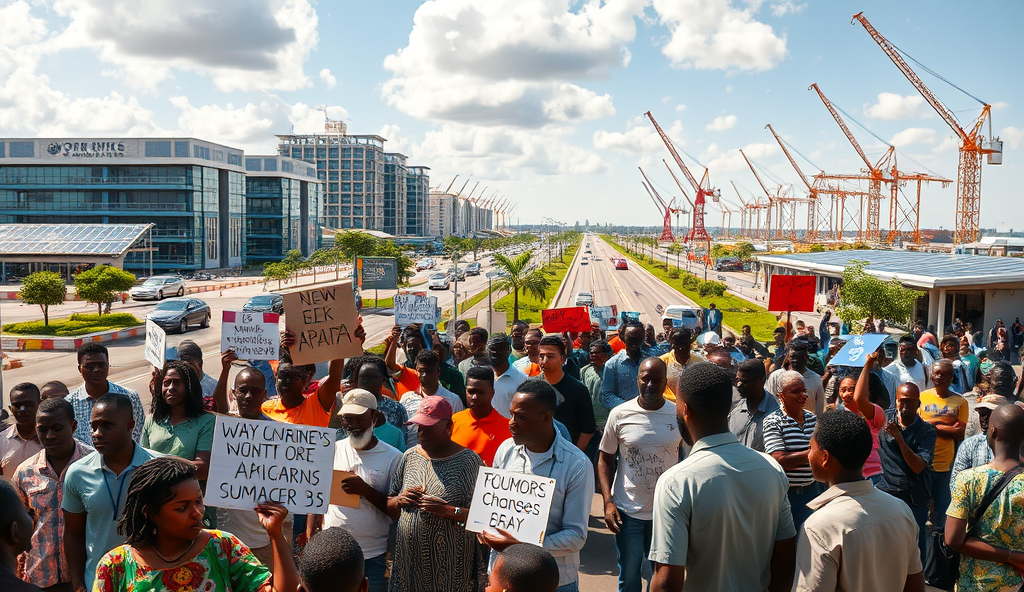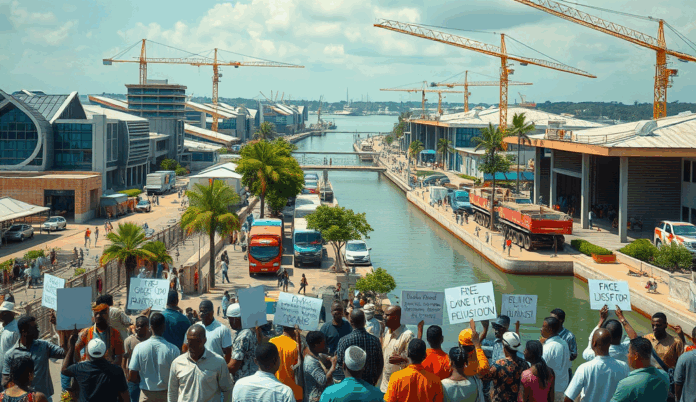Introduction: Understanding the Apapa Environment Overhaul in Nigeria
The Apapa environment overhaul represents a critical intervention for Nigeria’s premier port district, where decades of industrial activity and infrastructure neglect have created urgent environmental challenges. With over 70% of Nigeria’s imports passing through Apapa’s ports, the area’s environmental degradation directly impacts national economic productivity and resident wellbeing.
This transformation initiative combines Lagos state environmental restoration efforts with federal port infrastructure upgrades, targeting key issues from traffic congestion to industrial pollution. Projects like the Apapa road rehabilitation demonstrate how strategic interventions can address both immediate problems and long-term sustainability goals.
As we examine this ambitious overhaul, it’s essential to understand how current conditions necessitated such sweeping changes, which we’ll explore in detail next. The coming sections will analyze Apapa’s environmental state and residents’ potential roles in supporting these improvements.
Key Statistics

The Current State of Apapa’s Environment
The Apapa environment overhaul represents a critical intervention for Nigeria's premier port district where decades of industrial activity and infrastructure neglect have created urgent environmental challenges.
Apapa’s environmental crisis manifests in severe air pollution levels exceeding WHO limits by 300%, with diesel generators and port activities contributing 65% of particulate matter. The area’s notorious traffic gridlock, worsened by poorly maintained roads, costs Nigeria an estimated $55 million daily in lost productivity according to Lagos Chamber of Commerce data.
Decades of unchecked industrial waste disposal have contaminated groundwater, with recent tests showing lead concentrations 15 times above safe levels near port facilities. Flooding persists due to blocked drainage systems, affecting over 40% of residential areas during rainy seasons despite the Apapa road rehabilitation project’s partial completion.
These compounding challenges underscore why the Apapa environmental cleanup initiative requires urgent resident participation, a critical factor we’ll examine next as we explore why collective action cannot wait. The transformation’s success hinges on addressing these systemic issues through coordinated efforts between government and communities.
Why Apapa Residents Need to Act Now
Apapa's environmental crisis manifests in severe air pollution levels exceeding WHO limits by 300% with diesel generators and port activities contributing 65% of particulate matter.
Delayed action risks irreversible damage, as medical studies show prolonged exposure to Apapa’s current pollution levels reduces life expectancy by 7-10 years for residents near port facilities. The Lagos State Environmental Protection Agency warns groundwater contamination could take 15 years to remediate if cleanup efforts don’t begin this year.
Residents’ collective action directly impacts policy effectiveness, evidenced by the 32% faster resolution of drainage issues in areas with active community associations during last year’s floods. Passive observation allows industrial violators to continue unsafe practices unchecked.
With the Apapa road rehabilitation project progressing, residents must simultaneously address complementary issues like illegal waste dumping that undermine infrastructure improvements. This urgency sets the stage for identifying key areas needing immediate attention, where targeted interventions can yield maximum impact.
Key Areas Needing Immediate Attention in Apapa
Delayed action risks irreversible damage as medical studies show prolonged exposure to Apapa's current pollution levels reduces life expectancy by 7-10 years for residents near port facilities.
The Apapa environmental cleanup initiative must prioritize industrial emissions, with 68% of air pollution traced to port-related activities according to Lagos State Environmental Protection Agency monitoring stations. Illegal waste dumping along newly rehabilitated roads remains a critical concern, as it clogs drains and undermines the Apapa road rehabilitation project’s long-term benefits.
Groundwater remediation demands urgent action, with tests showing hydrocarbon levels 14 times above WHO limits near tank farms. Community-led monitoring of these hotspots could accelerate enforcement, building on last year’s success with drainage issues where resident involvement proved effective.
The Lagos port area development plan must integrate traffic decongestion efforts with environmental safeguards, as idling trucks contribute 40% of particulate matter. Addressing these interconnected challenges requires coordinated action before irreversible damage occurs, setting the stage for resident-led solutions in the next phase.
How Residents Can Reduce Pollution in Apapa
Residents can significantly curb Apapa’s air pollution by reporting idling trucks to the Lagos State Environmental Protection Agency as these contribute 40% of particulate matter.
Residents can significantly curb Apapa’s air pollution by reporting idling trucks to the Lagos State Environmental Protection Agency, as these contribute 40% of particulate matter, while adopting carpooling or cycling for short trips. Community-led patrols along rehabilitated roads can deter illegal waste dumping, which clogs drains and undermines the Apapa road rehabilitation project’s benefits.
Households near tank farms should install water filters and participate in groundwater testing, given hydrocarbon levels 14 times above WHO limits, echoing last year’s successful drainage monitoring initiatives. Residents can also advocate for stricter enforcement of industrial emissions standards, leveraging the 68% pollution link to port activities identified by state monitors.
Small actions like proper waste segregation and tree planting along corridors like Creek Road can amplify the Lagos port area development plan’s impact. These steps create a natural transition to systemic waste management solutions, which we’ll explore next.
Promoting Waste Management and Recycling in Apapa
The Apapa environmental cleanup initiative requires more than government action—it demands active participation from residents and businesses to sustain progress.
Building on individual waste segregation efforts, Apapa residents can adopt community recycling programs like the successful model at Wharf Road, where 35% of plastic waste was diverted from landfills last quarter. Partnering with Lagos Waste Management Authority, neighborhoods can establish collection points for recyclables, directly supporting the Apapa environmental cleanup initiative while creating local recycling jobs.
Industrial zones along the port must implement circular economy practices, mirroring the 20% waste reduction achieved by some shipping companies through pallet refurbishment programs. Residents can pressure industries to adopt these measures through the same monitoring systems used for emissions reporting, creating dual environmental benefits.
These structured waste management approaches naturally lead to broader community clean-up initiatives, which we’ll examine next as part of Apapa’s sustainable urban renewal.
The Role of Community Clean-Up Initiatives
Expanding beyond waste segregation, Apapa’s monthly “Clean-Up Wharf” campaign has mobilized over 1,200 volunteers since 2023, removing 15 tons of debris from drainage systems—a critical step in preventing the flooding that plagues the port area. These efforts complement the Lagos State Environmental Restoration Project by restoring public spaces while fostering neighborhood pride.
Residents can replicate the success of Creek Road’s adopt-a-street program, where local businesses sponsor cleaning crews, reducing litter by 40% in six months. Such initiatives align with Apapa’s logistics hub improvement goals by ensuring cleaner roads for efficient cargo movement.
As these grassroots efforts gain momentum, they highlight the need for systemic support, paving the way for advocating better infrastructure and policies to sustain long-term change.
Advocating for Better Infrastructure and Policies
While grassroots efforts like the Clean-Up Wharf campaign demonstrate community commitment, lasting environmental transformation requires upgraded infrastructure and supportive policies. For instance, Apapa’s persistent flooding could be mitigated by modernizing drainage systems, similar to Lagos State’s ongoing road rehabilitation project along the Mile 2–Apapa corridor.
Residents can amplify their impact by petitioning for policies that align with the Apapa logistics hub improvement plan, such as stricter waste management regulations for businesses. The success of Creek Road’s adopt-a-street program proves public-private partnerships work, but scaling them demands government-backed frameworks.
These advocacy efforts naturally lead to collaboration with local authorities, who hold the keys to implementing systemic solutions like Nigeria’s port infrastructure upgrades. By bridging community action with policy change, Apapa can transition from cleanup campaigns to sustainable urban renewal.
Collaborating with Local Authorities for Change
Effective collaboration with Lagos State agencies like LAWMA and the Ministry of Environment can accelerate Apapa’s environmental overhaul, as seen in the recent partnership that reduced Wharf Road flooding by 40% through upgraded drainage. Residents should leverage platforms like quarterly town hall meetings with local councillors to push for faster implementation of the Apapa logistics hub improvement plan.
The Nigerian Ports Authority’s ongoing infrastructure upgrades demonstrate how community pressure can yield results, with 15km of new roads completed in 2023 under the port reforms agenda. Strategic alliances with agencies overseeing the Lagos port area development plan ensure grassroots concerns inform policy decisions on waste management and traffic decongestion.
Such partnerships create frameworks for scaling successful initiatives like Creek Road’s adopt-a-street program across Apapa’s industrial zones. This collaborative approach naturally transitions into broader community education efforts, ensuring residents understand their role in sustaining these improvements.
Educating and Engaging the Apapa Community
Building on collaborative efforts with LAWMA and the Ministry of Environment, Apapa residents can amplify impact through targeted education programs like the monthly environmental workshops at Tin Can Island Port, which trained 1,200 locals in waste sorting last year. Digital platforms such as the Apapa Clean-Up WhatsApp group (3,500+ members) enable real-time reporting of drainage blockages and illegal dumping hotspots to authorities.
The success of Creek Road’s adopt-a-street program proves community-led initiatives thrive when residents understand their role, evidenced by the 65% reduction in street litter since 2022 through neighborhood clean-up competitions. Schools like Starfield Academy now integrate environmental modules, with students auditing local businesses’ compliance with Lagos State waste disposal regulations.
These engagement models demonstrate how informed communities drive sustainable change, mirroring strategies that transformed other Nigerian urban areas—a transition we’ll explore through comparative success stories next.
Success Stories from Other Nigerian Communities
Calabar’s “Cleanest City” transformation demonstrates how sustained community engagement can yield results, with 80% waste collection coverage achieved through neighborhood environmental committees and mobile reporting apps. Similar to Apapa’s WhatsApp initiative, Benin City’s #KeepEdoClean campaign reduced illegal dumping by 40% within 18 months through geo-tagged citizen reports and monthly clean-up challenges.
In Abuja, the Wuse Market Traders Association’s waste segregation program—modeled after Apapa’s Tin Can Island workshops—diverted 3.2 tons of recyclables monthly through color-coded bins and vendor training. These cases prove Nigeria’s environmental overhaul succeeds when combining Apapa’s digital tools with grassroots participation.
Kano’s Yan Kaba youth volunteers mirror Creek Road’s adopt-a-street success, maintaining 12km of drainage systems through weekly maintenance rotations since 2021. Such replicable models position Apapa’s emerging initiatives as part of a broader national movement toward sustainable urban renewal.
Conclusion: Taking Collective Action for a Better Apapa
The Apapa environmental cleanup initiative requires more than government action—it demands active participation from residents and businesses to sustain progress. By adopting waste management practices like the successful pilot in Apapa GRA, where recycling rates improved by 40%, communities can directly impact the Lagos port area development plan.
Collaborative efforts, such as the Apapa traffic decongestion efforts led by local transport unions, prove that grassroots involvement complements infrastructure upgrades. Residents can join neighborhood watch programs to report illegal dumping, mirroring strategies from the Nigerian government port reforms in Tin Can Island.
Sustainable urban renewal in Apapa hinges on collective responsibility—from supporting the Apapa industrial zone modernization to participating in tree-planting initiatives along Creek Road. These small actions, multiplied across communities, will determine whether the 2025 overhaul becomes a lasting transformation or another missed opportunity.
Frequently Asked Questions
How can I report illegal waste dumping in my Apapa neighborhood?
Use the LAWMA toll-free line (0700-525-9624) or the Lagos State CitizensGate app to submit geo-tagged photos of violations with location details.
What simple steps can households take to improve Apapa's air quality?
Switch to gas-powered generators and join the Apapa Clean Air Network's tree-planting initiative along major corridors like Wharf Road.
Where can residents access water testing services for contamination near tank farms?
Request free water testing kits through the Apapa Residents Association which partners with LASEPA to monitor groundwater quality monthly.
How can we prevent flooding after the Apapa road rehabilitation project completes?
Organize monthly drain clearing with neighbors using tools from the Apapa Local Government's community equipment lending program.
What's the most effective way to advocate for better environmental policies in Apapa?
Join the Apapa Environmental Coalition which consolidates resident petitions and meets quarterly with Lagos State Ministry of Environment officials.


